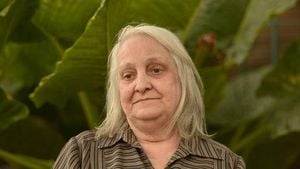A nurse who was suspended after complaining about a trans woman doctor using a female changing room insists she had never used the word "rapist" or made comments about "chromosomes," according to testimony heard at the tribunal.
Sandie Peggie was suspended from her position at Victoria Hospital in Kirkcaldy, Fife, in January 2024 after expressing concerns about Dr. Beth Upton, who identifies as female, using the female changing facilities. This incident occurred during Dr. Upton's use of the room on three occasions throughout 2023, leading Peggie to leave the space.
Peggie, who began her nursing career with Fife Health Board back in 1994, reported feeling uncomfortable when she first met Dr. Upton, noting, "He looked male. He had his hair in a ponytail, and there was an Adam's apple. I felt shocked." She cited her belief about Upton's gender affecting her comfort level, stating, "I was upset he was being allowed to use the changing rooms."
The employment tribunal, which convened in Dundee, has been listening to testimony from Peggie, who claims her suspension, initiated without explanation, was related to her expressing discomfort over Dr. Upton's presence.
According to Ms. Peggie, colleagues had voiced similar concerns, including supportive comments from both male and female staff members. A manager reportedly assured Peggie, "I’ll get it sorted," soon after the initial incidents. Suspended without clear rationale and with her suspension length extended on February 2nd, the situation escalated for Peggie, who said she felt hospital management was working against her return.
By March, after consulting with her lawyer, Ms. Peggie requested to return to work on different shifts, indicating her discomfort with the arrangements surrounding Dr. Upton. Her requests were reportedly denied, adding to her frustration as investigations continued even after her return on altered work patterns.
During her testimony, Peggie emphasized, "I never used any offensive language. I don’t recall using the word chromosomes. I never mentioned the word rapist." This statement was made in response to accusations levied against her of having bullying behavior, particularly focusing on her dialogue with Dr. Upton.
The exchange on Christmas Eve, described as "intimidated," ended with Peggie confronting Dr. Upton about being allowed to undress around her. "If I wanted to get changed in front of a man, I would have gone to the male changing rooms," she asserted.
Legal representatives for NHS Fife claimed Peggie's dissatisfaction arose from Upton simply being present. Upon cross-examination, Peggie confirmed the absence of any "physical abuse or harassment" during this interaction.
Jane Russell, representing NHS Fife and Dr. Upton, highlighted, "What you have complained about is Dr. Upton’s mere presence in the changing room, not anything she said or did." This phrase encapsulated the core of the legal disputes at this tribunal.
Dr. Upton's legal team described her as being deeply hurt by Peggie's perspective and her insistence on referring to Upton with prior gender identifiers. Despite this, Peggie contended, "I don’t believe I’ve harassed anybody," reiteratively distancing herself from discriminatory actions.
The tribunal proceedings highlighted how vastly different perspectives on gender identity and rights have manifested within the framework of NHS Fife operations, posing ethical dilemmas and prompting urgent discussions on equality and dignity.
Further allegations have emerged concerning the General Medical Council (GMC) and its handling of Dr. Upton's transition process, including criticisms from advocacy groups over transparency and patient care standards. Susan Smith from For Women Scotland argued, "Allowing a medic to falsify their records means putting the personal desires of the doctor ahead of the wellbeing of vulnerable patients." This reflects rising tensions and the need for clarity surrounding medical records and gender identity recognition.
The tribunal, expected to continue for up to ten days, stands at the intersection of workplace rights, gender identity, and legal interpretations under the prevailing Equality Act 2010, challenging established understandings of inclusion and personal space within shared environments.
Reflecting on this complex case, Peggie's claims raise important discussions about the balance between the rights of trans individuals and the feelings and beliefs of their colleagues, leaving many questioning how institutions can navigate these sensitive dynamics.



